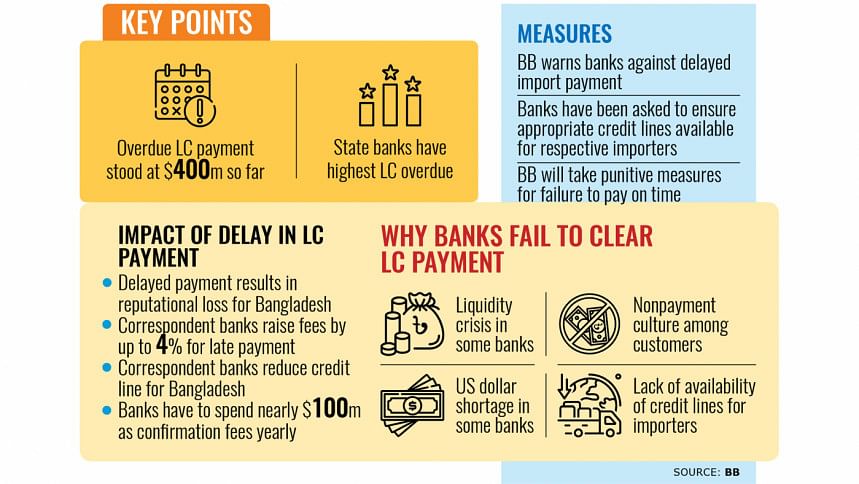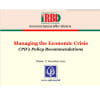Import payment delay a reputational loss for Bangladesh: BB

Despite an overall improvement in foreign currency stocks, some state-run banks and Shariah-based lenders are not making import payments on time, prompting the central bank to issue a notice and warn of punitive actions against bank officials.
In the notice issued yesterday, the Bangladesh Bank (BB) said delays and defaults on import payments damage Bangladesh's image on the international stage and push up import costs, eventually weighing on people who are struggling under persistent price pressures.
The overdue letter of credit (LC) payments stand at $400 million so far, with state-run banks having the highest overdue LC payments, central bank officials on condition of anonymity told The Daily Star.
Meanwhile, industry insiders attributed the delayed payment of import bills by the banks to the taka and dollar crises, a lack of availability of credit lines for importers and a culture of non-payment.
At a meeting on Monday, the issue of delayed import payments was discussed between managing directors and CEOs of seventeen banks and the Bangladesh Bank governor.
In yesterday's notice, the banking regulator said that delays in payments deteriorate correspondent relations with counterparts and increase import costs.
Given the current improved foreign exchange situation, the forex market of the country is in a long position, it said, adding that delays in making import payments by banks are "not acceptable" against clean bills and accepted bills.
"The result of delayed payment is a reputational loss for Bangladesh, leading to higher costs for imports relating to confirmation charges, trade credit, etc," read the BB's notice.
Seeking anonymity, a senior official of the central bank told The Daily Star that some banks, especially two or three state-run banks and some Shariah-based banks, continually fail to pay import bills, which ultimately increases the cost of imports.
He said some local banks will have to settle import payments with up to 4 percent confirmation charges, which was 2 to 2.50 percent earlier.
The correspondent banks imposed higher confirmation charges, a security mechanism that minimises risks for exporters, due to delays in import payments.
Bangladesh spends around $100 million annually on confirmation charges for imports, the official informed.
Due to the reputational loss of the country's financial sector, the official said that some foreign lenders have reduced credit lines, while others are suspending them for Bangladesh.
For instance, he said Dubai-based Mashreq Bank has already reduced its credit line for Bangladesh.
Syed Mahbubur Rahman, managing director and CEO of Mutual Trust Bank, told The Daily Star that the charge for confirming LCs remains between 2.50 and 3 percent annually, depending on the client, but has been pushed up further due to a failure to settle import bills on time.
He said correspondent banks previously did not bother about the identity of the importers or customers, but nowadays they want to know who the customers are.
"Some banks just say that I cannot pay the import bills because I have yet to get the payment from the customer. But the actual thing is that the bank does not have the right to say that."
Rahman, also a former chairman of the Association of Bankers, Bangladesh (ABB), said that in some cases when importers are not paying their bank, the lender creates the liability as a forced loan and the bank does not want to pay the import bill in that scenario.
BB measures against payment delays
In the notice, the central bank also asked banks to clear unsettled import bills immediately and said that lenders must ensure appropriate credit lines are available for the respective importers before issuing letters of credit.
The BB asked banks to ensure adequate cashflow and prospective fund arrangements to cover import payments in cases of issuance of LCs on behalf of importers without underlying credit facilities.
The central bank's notice said that usance imports should be financed through buyer's credit through offshore banking operations or using the banks' own funds in terms of the foreign exchange transaction guidelines.
The banking regulator warned that failure to settle payments on time is subject to punitive actions, including personal accountability for the officials responsible for the transactions.

 For all latest news, follow The Daily Star's Google News channel.
For all latest news, follow The Daily Star's Google News channel. 







Comments